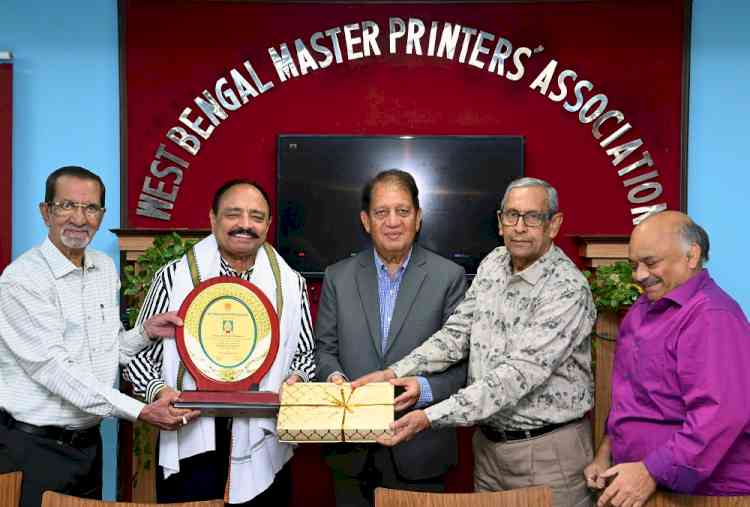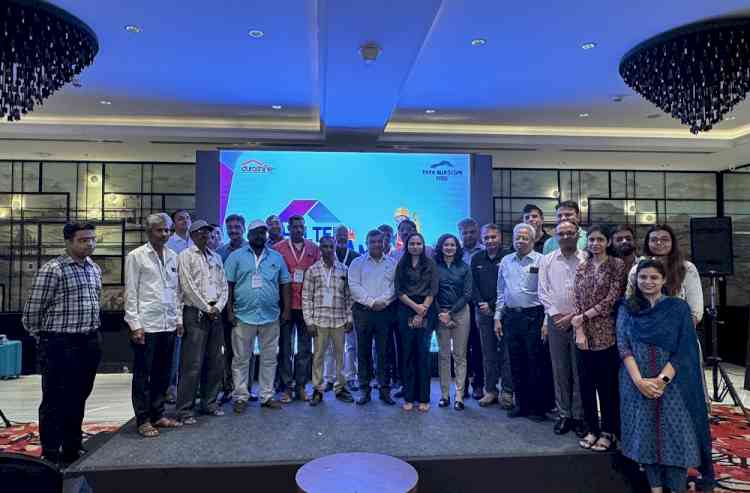Maize workshop begins at PAU; popularise maize among farmers, industry and consumers: Experts
Author(s): City Air NewsA photograph related to Maize workshop being held at PAU, Ludhiana on Saturday. Ludhiana, April 4, 2015: The “58th Annual Workshop of All India Coordinated Research Project on Maize (AICRPM)” began at the Punjab...


A photograph related to Maize workshop being held at PAU, Ludhiana on Saturday.
Ludhiana, April 4, 2015: The “58th Annual Workshop of All India Coordinated Research Project on Maize (AICRPM)” began at the Punjab Agricultural University (PAU) today amidst the gathering of distinguished maize scientists from across the country. The three-day workshop has been jointly organised by The Crop Improvement Society of India and the Department of Plant Breeding and Genetics, PAU.
On the occasion, Dr Gurbachan Singh, Chairman, Agricultural Scientists Recruitment Board, New Delhi was the chief guest while Dr J.S. Sandhu, Deputy Director General (Crop Sciences), Indian Council of Agricultural Research (ICAR) was the guest of honour. Dr Baldev Singh Dhillon, Vice-Chancellor, PAU presided over the inaugural session. Besides, Dr Amarjit Singh Khera, former Vice-Chancellor, PAU; Dr S.K. Sharma, Chairman, Research Advisory Committee, Indian Institute of Maize Research (IIMR), New Delhi; and Dr I.S. Solanki, Assistant Director General (Food and Fodder Crops), ICAR were the special guests. Dr O.P. Yadav, Director, IIMR also shared his views during the workshop.
In his inaugural address, Dr Gurbachan Singh said maize crop is ecologically suitable for Punjab, Haryana and western Uttar Pradesh. Its cultivation must be promoted among the farmers for it has a great scope in terms of marketing, processing and value addition, he added. “According to contemporary farm scenario, many farmers are cultivating small land holdings,” he pointed out, while emphasizing on adopting integrated farming approach. With declining profits and increasing cultivation costs, maize can play a vital role in sustaining productivity, he said. Stating, “We need to produce more from less area and less water,” Dr Singh said water share, in the next 20 years, may drop from 80 per cent at present to 72 per cent. The power of new sciences such as nanotechnology and biotechnology must be used in various crops, he advised. Besides, he urged the maize experts to lay stress on density management in maize.
Dr Sandhu said maize is a unique crop and has multiple uses in terms of feed, food, fodder and fuel. “The productivity of maize is highest in Tamil Nadu with 5.4 tonnes, Punjab - 4 tonnes, Haryana - 3 tonnes, Uttar Pradesh -1.8 tonnes,” he disclosed. In Punjab, Kapurthala, Hoshiapur, Patiala, Shaheed Bhagat Singh Nagar and Tarn Taran districts have contributed significantly to the enhancement of maize productivity, he said. Calling maize a climate resilient crop, Dr Sandhu stressed on focusing on crop management as well as demand-supply.
Dr Dhillon, while highlighting the achievements of PAU maize section, underlined the need for change in stereotype research and improvement in quality of testing. Quality protein maize needs to be pushed, he said, while suggesting focusing on marker assisted selection and double haploid technology in maize breeding. Since maize is a promising crop for diversification, there is a need to study its nutritional value too, he added. Dr Dhillon also emphasized on addressing the issue of climate variations, he added.
Referring to Prime Minister, Narendra Modi’s “Make in India” campaign, Dr Khera called upon the maize scientists to develop their own varieties and have their own public-private partnership. He said major emphasis should be on maize and cotton as both the crops are wide spacing. In addition, attention should also be paid to crop improvement, he added.
Dr Sharma observed maize research has undergone a sea change in the last few years. The challenges of genetic enhancement and strengthening of seed production progarmme need to be addressed, he observed. He congratulated the maize scientists for the upgradation of Directorate of Maize Research to Indian Institute of Maize Research.
Dr Solanki said maize is the third most important cereal crop of the country. Therefore, it should be popularized among farmers, industry and consumers, he added. More thrust is being laid on single cross hybrids as they have shown resistance to various insect-pests and tolerance to drought, he observed. Dr Solanki also stressed on setting-up of industries in the areas where maize is grown in volumes.
Highlighting the achievements of AICRPM 2014, Dr Yadav disclosed, “The country recorded the highest maize production with 25 million tonnes and highest maize productivity with 26 quintals per hectare.” He said that 17 new varieties of maize were released during the last year. According to the 12th Plan of ICAR, five new Centers on Maize are set to come up in West Bengal, Bihar, Maharashtra and in remote areas, he revealed.
Earlier, Dr Balwinder Singh, Director of Research, PAU while welcoming the dignitaries and the delegates, said the maize production has doubled in the past few years and by 2025, its production is expected to escalate all the more. “Grown in 160 countries, maize is the first crop to benefit from hybridization,” he highlighted. PAU has the credit of developing first single cross maize hybrid, he disclosed, while adding the university has released 41 high yielding composites/hybrids of maize so far. The cultivation of sweet corn, baby corn and quality protein maize can give additional income to the farmers, he added.
Dr H.S. Dhaliwal, Dean, College of Agriculture, proposed the vote of thanks. On the occasion, a souvenir and a CD on annual report of AICRPM 2014 were released. Besides, Best AICRP Centre Award was bestowed on Tamil Nadu Agricultural University, Punjab Agricultural University and a maize hybrid producing firm. In addition, certificates were distributed for the protection of plant varieties and Farmers’ Rights Act.
Date:
Saturday, April 4, 2015

 cityairnews
cityairnews 
















